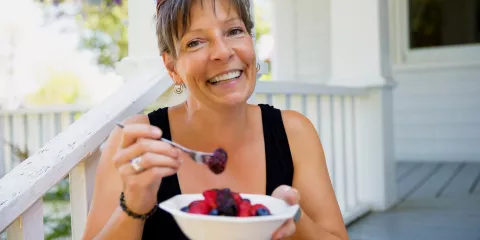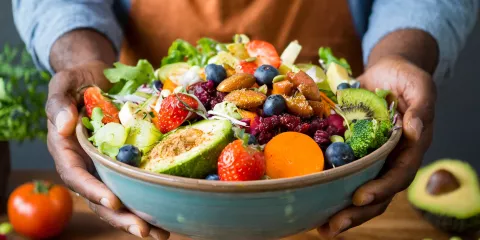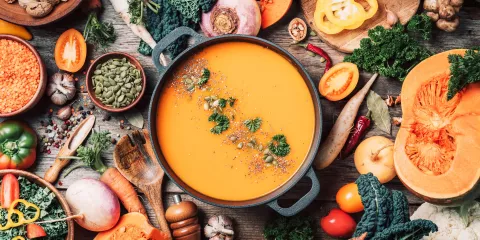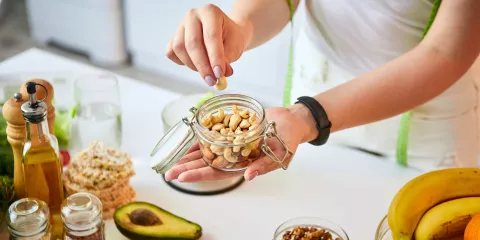
As more information emerges in favor of plant-based eating, the vegan diet has become a popular choice. It’s the epitome of “plant-based,” so it should hold the most benefits to your health, right?
In this post, we’ll give you an overview of the vegan diet. This includes what it is, how to follow it safely and additional information about difficulty and supplementation.
We hope this post empowers you to make individualized dietary decisions alongside your healthcare provider.
What Is the Vegan Diet?
The vegan diet is a type of plant-based diet. In fact, a vegan diet excludes all forms of animal-based products. That means no meat, no animal byproducts and no ingredients that come from animals.1-3
When following a vegan diet, every food (and every ingredient found in food) should come from a plant. This is unlike the vegetarian diet, specifically ovo-lacto vegetarian, where some animal products can be consumed, such as eggs and milk.2-3
How to Follow a Vegan Diet (Safely)
The vegan diet excludes all animal food and animal-derived food. But what does that really mean? Here is a list of foods to avoid on a vegan diet:2-3
- Animal meat (beef, pork, lamb, poultry, fish, etc.)
- Animal milks (goat, cow, etc.)
- Eggs
- Cheese
- Yogurt (from cow, goat, sheep)
- Dairy ingredients (sour cream, cream cheese, butter, etc.)
- Dairy treats (ice cream, sherbet, custard, etc.)
- Mayonnaise
- Honey (derived from bees)
- Gelatin (made from boiled animal parts)
- Lard
Now that you know what foods should be avoided, let’s talk about how to craft a balanced and healthy vegan diet for yourself.
What Foods to Eat on a Vegan Diet
When excluding all animal-based foods, you still have many choices with which to fill your plate! Here are foods allowed on a vegan diet:1
- Fruits
- Vegetables
- Starches (potatoes, corn, peas, etc.)
- Grains that are 100% vegan (bread, crackers, pasta, but be sure to check the labels)
- Beans and legumes
- Nuts and seeds
- Plant-based fats (olive oil, canola oil, avocado, etc.)
- Plant-based dairy products
- Plant-based meat alternatives
Nowadays, you can find all kinds of vegan foods at the grocery store. There may even be entire sections dedicated to vegan living.
You can also look for an icon on food packaging that tells you it is vegan. However, if you see something like “100% vegetarian,” that does not mean it is necessarily vegan!
How to Avoid Being Too Restrictive
If you want to follow a vegan diet by the book, it’s important to look at the ingredients list on all of your food. For example, commercial bread may contain milk and honey – both of which are not vegan!
Strict vegan diets may require you to radically change what items you buy and what foods you cook at home.
To avoid being overly restrictive, some vegans allow themselves to eat things like commercially-prepared breads and other foods. This leniency gives them a wider range of convenient choices at the grocery store.
How to Find Nutritious Substitutions
Cutting out animal foods and ingredients may seem simple, but you’ll have to find alternatives to ensure you’re still getting all the nutrients you need.
Even though there are all sorts of commercially available vegan foods, not all are nutritionally equivalent to their animal counterparts. Let’s take a look at some vegan alternatives and identify which are generally the best options. Since tree nuts, peanuts, and soy are among the major food allergens, some people may need to avoid nuts and soy-based products.
| Animal-Based Food | Vegan Offerings | Best Options | Rationale |
|---|---|---|---|
| Meat | Commercial meat alternatives, textured vegetable protein (TVP), tofu, legumes, edamame, nuts, seeds, jackfruit, mushroom | Tofu, legumes, edamame, nuts, seeds, jackfruit, mushroom | Boast a plethora of nutritional benefits such as protein, micronutrients and fiber. |
| Eggs (for cooking, baking) | Commercial vegan eggs, tofu, chia seeds, starch mixtures, applesauce, banana, aquafaba, flaxseed meal | Flaxseed meal, tofu, banana, chia seeds, applesauce, aquafaba | Pack more of a nutritional punch, including fiber, complete protein and/or healthy fats. |
| Cheese | Commercial vegan cheese, nutritional yeast, cashew cheese | Nutritional yeast | Has a nutty taste, almost like Parmesan cheese as well as added nutrition. |
| Dairy | Milk, yogurt and ice cream made from oats, almonds, hemp, pea, soy, coconut and cashew | Soy products (soy milk, soy yogurt), pea products | Have a similar amount of protein as cow’s milk; other plant-based milks are much lower in protein.4 |
| Honey | Agave, sugar, molasses, maple syrup, dates, dried fruits, coconut sugar | Molasses, dates, dried fruits | Contain antioxidants to offer more than just sweetness;5 dried fruit offers fiber, but is relatively high in calories and sugar, so portion control is important. |
| Lard and butter (for cooking, baking) | Avocado, plant-based oils, olive oil, palm oil | Avocado, plant-based oils, especially olive oil | Offer heart-healthy unsaturated fats while still providing a fatty mouthfeel. |
Remember: Commercially prepared vegan food is not necessarily “healthier” than something prepared with animal ingredients. Packaged vegan foods may still contain additives, added sugars and preservatives.6-7 Read package labels carefully, including the Nutrition Facts panel.
Vegan Diet FAQs
We’ll answer some commonly asked questions about the vegan diet so that you can better determine if it’s right for you.
What Are the Benefits of the Vegan Diet?
There are a variety of benefits to the vegan diet, more specifically:
- Helps you align personal values: If you decide to avoid animal products for ethical or environmental reasons, veganism is something you can do to protect animals and the world.
- Higher dietary fiber and phytonutrient intake: When you prioritize plant-based foods, you also give yourself more dietary fiber via fruits, vegetables, grains, nuts, seeds and legumes.8-9
- May lower cardiovascular disease risk: Research suggests that following a plant-based diet may reduce your risk for cardiovascular mortality and cardiovascular disease.10 Even so, questions still remain about the effects of vegan diets on specific markers of cardiovascular health and more research is needed.11
Is it Hard to Follow a Vegan Diet?
Compared to other diets, following a vegan diet isn’t too difficult. While the main guideline is to eliminate animal-based foods, you have a choice as to how “strict” your vegan diet will be. For example, you may choose to eat vegan, yet include honey and commercially prepared breads that may contain milk, eggs or butter.
However, one of the hardest aspects of a vegan diet is the desire for your favorite foods (that contain animal ingredients) and the inability to find a satisfying alternative.
Another challenge is the social aspect. Even though more restaurants are accommodating vegans, you may still have difficulty finding diverse choices when eating out. Social gatherings can cause difficulty as well, especially if friends and family are uninformed about vegan eating.
Based on personal stories of individual vegans, these situations can lead to feelings of isolation, disconnect and one’s diet becoming a burden to others.12-14
Are There Safety Concerns with the Vegan Diet?
Prior to starting a new diet, consult with your doctor and/or dietitian. Certain diets can put you at risk for nutrient deficiencies, nutrient toxicities, worsening of health status and/or adverse drug-nutrient interactions.
Let’s talk about safety concerns for the vegan diet:
- Potential for nutrient deficiencies: Poorly planned vegan diets can lead to nutrient deficiencies (see the next FAQ). Also, some nutrients (e.g., iron, protein) are found in plant-based foods, but they may be harder for the body to “unlock” compared to when found in animal sources.6,15
- Potential risks of disordered eating: A vegan diet may require significant food restriction, label reading and food awareness. In certain people, this can lead to food obsession and/or eating disorders.
- Potential for protein malnutrition (rare): There are plenty of great plant-based proteins out there! However, if someone fails to consume enough protein from plant-based sources (often due to lack of knowledge or preference) this can put them at risk for protein malnutrition.6
Do I Need to Take Supplements on a Vegan Diet?
In most cases, it is best to obtain nutrients from food sources first. Supplements can be used to fill in nutritional gaps, meet specific nutrient needs and/or when one’s diet lacks certain nutrients.
Remember to consult with your doctor before starting or changing your supplement regimen. Supplements can play a part in your health status and impact how certain medications work.
Without proper education, testing and monitoring, vegans can be at risk of nutrient deficiencies involving:6,9,15-16
- Iodine
- Calcium
- Zinc
- Protein
- Vitamin B12
- Iron
- Vitamin D
When you’re deficient, supplementation and/or dietary changes may be required. Nutrient levels should be tested and supplementation should be discussed and analyzed by a healthcare provider prior to starting.
Related: What’s Missing From Your Diet?
In Summary
Following a vegan diet can be a great way to prioritize more fruits, vegetables and plant-based proteins. It may also help you better align your lifestyle with ethical and environmental values.
However, it’s essential that you avoid overly restrictive practices. Work with your doctor and dietitian to ensure that your vegan diet is nutritionally complete.
References
1 National Health Service. The vegan diet. NHS Website. Updated May 31, 2022. Accessed January 23, 2023.
2 Klemm S. Vegetarianism: The basic facts. Eat Right Website. Published October 1, 2021. Updated September 3, 2021. Accessed January 23, 2023
3 National Institutes of Health. Vegetarian diet. Medline Plus Website. Accessed January 23, 2023.
4 Torborg L. Mayo Clinic Q and A: Dairy milk, soy milk almond milk – which is the healthiest choice for you? Mayo Clinic Website. Published April 9, 2019. Accessed January 23, 2023.
5 Phillips KM, Carlsen MH, Blomhoff R. Total antioxidant content of alternatives to refined sugar. J Am Diet Assoc. 2009 Jan;109(1):64-71. doi: 10.1016/j.jada.2008.10.014. PMID: 19103324.
6 Caspero A, Klemm S. Building a healthy vegetarian diet: Myths and facts. Eat Right Website. Published October 4, 2021. Updated September 27, 2021. Accessed January 23, 2023.
7 Zanteson L. Plant-based meat alternatives. Today’s Dietitian. 2021;23(8):42
8 Clarys P, Deliens T, Huybrechts I, Deriemaeker P, Vanaelst B, De Keyzer W, Hebbelinck M, Mullie P. Comparison of the nutrition quality of the vegan, vegetarian, semi-vegetarian, pesco-vegetarian and omnivorous diet. Nutrients. 2014;6(3):1318-1332
9 McManus K. What is a plant-based diet and why should you try it? Harvard Health Publishing Website. Published November 16, 2021. Accessed January 23, 2023.
10 Quek J, Lim G, Lim WH, Ng CH, So WZ, Toh J, Pan XH, Chin YH, Muthiah MD, Chan SP, Foo RSY, Yip J, Neelakantan N, Chong MFF, Loh PH, Chew NWS. The association of plant-based diet with cardiovascular disease and mortality: A meta-analysis and systematic review of prospect cohort studies. Front Cardiovasc Med. 2021;8:756810
11 Kaiser J, van Daalen KR, Thayyil A, Tasso de Almeida Ribeiro Reis Cocco M, Caputo D, Oliver-Williams C. A systematic review of the association between vegan diets and risk of cardiovascular disease. J Nutr. 2021;151(6):1539-1552
12 Brownble. “Othered” and “othering”: Feeling separate, distant or isolated when going vegan. Brownble Website. Published August 29, 2018. Accessed January 23, 2023.
13 Vegan Trade Journal. Social pressure “hardest part” of veganism. Vegan Trade Journal Website. Published November 1, 2016. Accessed January 23, 2023.
14 Mann C. Living as a stranger in a strange land. Vegan Psychologist Website. Accessed January 23, 2023.
15 Klemm S. Food sources of 5 important nutrients for vegetarians. Eat Right Website. Published October 15, 2021. Updated September 27, 2021. Accessed January 23, 2023.
16 Sakkas H, Bozidis P, Touzios C, Kolios D, Athanasiou G, Athanasopoulou E, Gerou I, Gartzonika C. Nutritional status and the influence of the vegan diet on the gut microbiota and human health. Medicina. 2020;56(2):88












